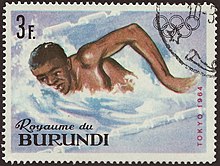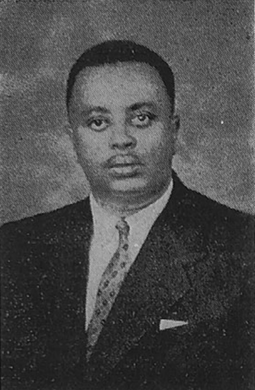
Louis Rwagasore was a Burundian prince and politician, who served as the second prime minister of Burundi for two weeks, from 28 September 1961 until his assassination on 13 October. Born to the Ganwa family of Burundian Mwami (king) Mwambutsa IV in Belgian-administered Ruanda-Urundi in 1932, Rwagasore was educated in Burundian Catholic schools before attending university in Belgium. After he returned to Burundi in the mid-1950s he founded a series of cooperatives to economically empower native Burundians and build up his base of political support. The Belgian administration took over the venture, and as a result of the affair his national profile increased and he became a leading figure of the anti-colonial movement.
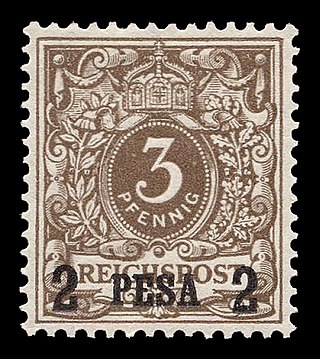
This is a survey of the postage stamps and postal history of German East Africa.

Ruanda-Urundi, later Rwanda-Burundi, was a colonial territory, once part of German East Africa, that was occupied by troops from the Belgian Congo during the East African campaign in World War I and was administered by Belgium under military occupation from 1916 to 1922. It was subsequently awarded to Belgium as a Class-B Mandate under the League of Nations in 1922 and became a Trust Territory of the United Nations in the aftermath of World War II and the dissolution of the League. In 1962 Ruanda-Urundi became the two independent states of Rwanda and Burundi.
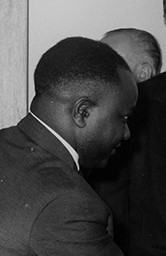
Pierre Ngendandumwe was a Burundian politician. He was a member of the Union for National Progress and was an ethnic Hutu. On 18 June 1963, about a year after Burundi gained independence and amidst efforts to bring about political cooperation between Hutus and the dominant minority Tutsis, Ngendandumwe became Burundi's first Hutu prime minister. He served as prime minister until 6 April 1964 and then became prime minister again on 7 January 1965, serving until his death. Eight days after beginning his second term, he was assassinated by a Rwandan Tutsi refugee.

The Kingdom of Burundi, also known as Kingdom of Urundi, was a Bantu kingdom in the modern-day Republic of Burundi. The Ganwa monarchs ruled over both Hutus and Tutsis. Created in the 16th century, the kingdom was preserved under German and Belgian colonial rule in the late 19th and early 20th century and was an independent state between 1962 and 1966.
The Ruanda-Urundi franc was a currency issued for the Belgian mandate territory of Ruanda-Urundi in 1960–62 which continued to circulate within its successor states of Rwanda and Burundi until 1964. The currency replaced the Belgian Congo franc which had also circulated in Ruanda-Urundi from 1916 to 1960 when the Belgian Congo became independent, leaving Ruanda-Urundi as the sole Belgian colonial possession in Africa. With the independence of Rwanda and Burundi in 1962, the shared Ruanda-Urundi franc continued to circulate until 1964 when it was eventually replaced by two separate national currencies.

Léopold Bihumugani or Biha (1919–2003) was a Burundian politician who served as Prime Minister of Burundi from 13 September 1965 until 8 July 1966. A Ganwa born to a chief in Ruanda-Urundi, he became a close confidant of Mwami Mwambutsa IV in the 1940s after being given charge of a chiefdom which included some of the monarch's property. In the late 1950s he became involved in the Union for National Progress (UPRONA) party as the Belgian colonial administration prepared to grant Burundi its independence. Biha left the party after becoming disenchanted with leader Louis Rwagasore's populist style, and held different roles in transitional governments. He created a new party, Burundi Populaire, but failed to get elected to office and was appointed private secretary to the Mwami after independence.
Joseph Cimpaye was a Burundian politician and writer.
Cambodia used the postage stamps of Indochina until the early 1950s. In 1949 Cambodia became an associated state of the French Union but gained independence in 1953 and left the Union in 1955.
André Muhirwa was a Burundian politician who served as prime minister of Burundi from 1961 to 1963. He became prime minister following the assassination of his predecessor, Louis Rwagasore. A member of the Union for National Progress (UPRONA), he previously served as Minister of the Interior from September to October 1961.
This is a survey of the postage stamps and postal history of the Democratic Republic of the Congo, formerly Zaire and the Belgian Congo.

This is a survey of the postage stamps and postal history of Rwanda. The Republic of Rwanda is a landlocked country located in the Great Lakes region of eastern-central Africa, bordered by Uganda, Burundi, the Democratic Republic of the Congo and Tanzania.

This is a survey of the postage stamps and postal history of Niger, a former French colony that obtained independence in 1960.

The African territories of Ruanda and Urundi came under Belgian control as Ruanda-Urundi after they were seized from Germany during World War I in 1916. They had previously formed part of German East Africa.

Jean-Paul Harroy was a Belgian colonial civil servant who served as the last Governor and only Resident-General of Ruanda-Urundi. His term coincided with the Rwandan Revolution and the assassination of the popular Burundian political leader Prince Louis Rwagasore. It has been alleged that Harroy may have been implicated in the murder.
Roberto Régnier was a Belgian Colonial official in Ruanda-Urundi. He served as Regent from 28 July 1961 to January 1962 and as High Representative of Burundi for no more than six months starting in January 1962.

Paul Mirerekano was a Burundian politician. Ethnically Hutu, he worked as an agronomist for the Belgian colonial administration in Ruanda-Urundi before starting a successful market garden in Bugarama. Politically, he was a nationalist, monarchist, and advocate for Hutu civil rights. He was a leading member of Louis Rwagasore's political party, the Union for National Progress (UPRONA), and in 1961 served as the organisation's interim president. Rwagasore's assassination in 1961 fueled a rivalry between Mirerekano and Prime Minister André Muhirwa, as both men claimed to be the heirs to Rwagasore's legacy and sought to take control of UPRONA. The controversy led to the coalescing of two factions in the party, with Mirerekano leading what became known as the Hutu-dominated "Monrovia group". His criticism of Muhirwa and his successor led him to be arrested on several occasions, but in 1965 he was elected to a seat in the National Assembly representing the Bujumbura constituency. The body subsequently elected Mirerekano its First Vice-President on 20 July. In October Hutu soldiers launched a coup attempt which failed, but led to the outbreak of ethnic violence. The government believed Mirerekano helped plan the coup attempt and executed him. His reputation remains a controversial subject in Burundi.
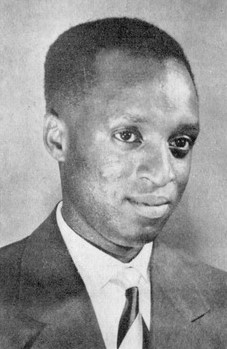
Joseph Biroli-Baranyanka or Joseph Biroli was a Burundian politician and was the first Burundian to receive a university education. Born in 1929 to a prominent chief, he was a Ganwa of the Batare clan. He performed well as a student and earned a diploma from the Institut universitaire des Territoires d'Outre-Mer in 1953. After continuing his education at several other universities he took up work for the European Economic Community. In 1960 his brother Jean-Baptiste Ntidendereza co-founded the Christian Democratic Party, and Biroli became the party's president. His main political rival was Prince Louis Rwagasore, a Ganwa of the Bezi clan who led the Union for National Progress. Biroli was friendly to the Belgian colonial administration in Ruanda-Urundi, while UPRONA demanded immediate independence.
Jean-Baptiste Ntidendereza was a Burundian politician. A co-founder of the Christian Democratic Party, he served as Minister of Interior of Burundi in 1961. He was later convicted of conspiring to kill Louis Rwagasore, a political opponent, and publicly executed.
Valentin Bankumuhari was a Burundian politician.
